A commercial coffee machine is designed to meet the needs of busy cafés, restaurants, and offices. Unlike home machines, these are built to handle high volumes and constant use. In this guide, we’ll explore what is a commercial coffee machine, what makes these machines essential for business, and how to choose the right one.
Key Takeaways
- Commercial coffee machines are designed for high-volume settings and include essential components like boilers, group heads, and steam wands to ensure quality espresso rapidly.
- Types of commercial coffee machines include fully automatic, semi-automatic, and manual, each catering to different operational needs and barista skill levels.
- Choosing the right commercial coffee machine involves considering factors such as size, features, budget, and maintenance requirements to ensure optimal performance and customer satisfaction.
Defining a Commercial Coffee Machine
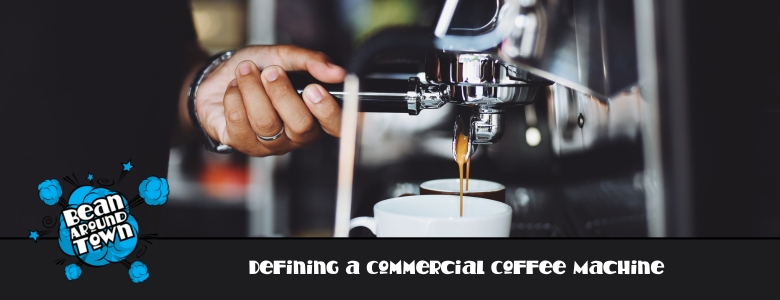
Table of Contents
A commercial espresso machine is designed to brew one cup of espresso using pressure and heat, making it a powerhouse in high-volume settings. Unlike household coffee machines, commercial coffee machines are built to withstand heavy-duty use, featuring larger boilers and heating elements to meet the demands of busy cafés and restaurants.
These machines are essential for creating espresso shots quickly and efficiently, ensuring customers receive their favourite beverages without long waits.
In addition to brewing espresso, commercial coffee machines come with essential accessories for steam milk frothing, bean grinding, and precise temperature and volume control. These features enhance coffee quality and equip baristas to craft the perfect cup.
Grasping these fundamental aspects helps you select the right machine for your business.
Key Components of Commercial Coffee Machines
Commercial coffee machines are intricate pieces of equipment, and their performance hinges on several key components.
These include boilers, group heads, steam wands, and grinders, each playing a vital role in how commercial coffee machines work in the coffee-making process.
Let’s delve into these components to understand how they contribute to the machine’s functionality and the quality of the coffee produced.
Boilers
Boilers are the heart of any commercial coffee machine, responsible for maintaining the temperature and pressure needed for brewing espresso.
There are four primary types of boilers:
- Thermoblock
- Single
- Heat exchange
- Dual or multi-boilers
Each type offers unique advantages, catering to different needs and preferences. For instance, a single-boiler coffee machine is suitable for smaller operations, while a heat exchange boiler allows for simultaneous brewing and steaming by circulating water through a chamber that maintains a consistent temperature.
Dual or multi boilers are particularly beneficial in high-volume settings, as they have separate boilers for brewing coffee and steaming milk, providing enhanced temperature stability and consistency.
This separation ensures that the coffee’s brewing temperature remains unaffected by the steaming process, resulting in consistently high-quality espresso.
Group Heads
Group heads are another critical component of commercial coffee machines. These metal bells, attached to the machine, are essential for brewing espresso by providing the necessary pressure and temperature stability.
The portafilter, which holds the packed espresso beans during brewing, plays a crucial role in ensuring the quality of the espresso produced. Temperature stability is a key design focus, particularly in machines like Expobar, to ensure consistent brewing quality.
Steam Wands
Steam wands, also known as steam pipes, are essential for frothing milk and creating the creamy texture required for various espresso-based beverages.
These components deliver steam that froths the milk, making them indispensable for crafting drinks like lattes and cappuccinos.
Some advanced machines, like those from Expobar or La Mazocco, feature no-burn steam wands, enhancing user safety and ease of use.
Types of Commercial Coffee Machines
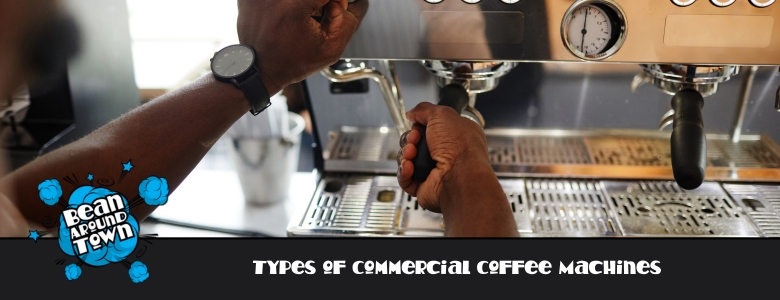
Commercial coffee machines come in various types, each catering to different operational needs and user preferences. These machines can be broadly categorised into:
- Super-automatic
- Fully automatic
- Semi-automatic
- Manual
Each type offers unique features and benefits.
Understanding these types will help you choose the right machine for your business.
Fully Automatic Coffee Machines
Fully automatic coffee machines offer a balance between user control and automation. These machines deliver consistent coffee quality using standardised water volumes, often featuring integrated grinders and automated water management.
This combination of features makes fully automatic machines easy to use while still allowing some level of customisation.
These commercial machines are perfect for businesses prioritising consistency and ease of use. They provide a reliable way to produce high-quality coffee without requiring extensive staff training, making them a practical choice for many cafes and restaurants.
Semi-Automatic Coffee Machines
Semi-automatic coffee machines offer more control over brewing, allowing skilled baristas to manipulate the parameters to create high-quality espresso. In these machines, the barista presses the ‘start’ and ‘stop’ buttons to control the brewing, allowing them to fine-tune each shot.
This level of control is ideal for baristas who want to perfect their craft and produce exceptional coffee.
These machines are recommended for venues where the barista’s skill and experience are valued, allowing them to deliver a personalised coffee experience to customers.
Manual Coffee Machines
Manual coffee machines demand complete manual control over every brewing process step. They offer the highest potential for espresso quality but require significant skill. Extreme coffee enthusiasts often favour these machines, and they appreciate the labour-intensive nature and precision of making each cup.
Passionate coffee enthusiasts who enjoy hands-on experience will find that manual machines offer the ultimate customisation and control. They are typically used in specialty cafes where the focus is on delivering a unique and high-quality ground coffee experience.
Factors to Consider When Choosing a Commercial Coffee Machine
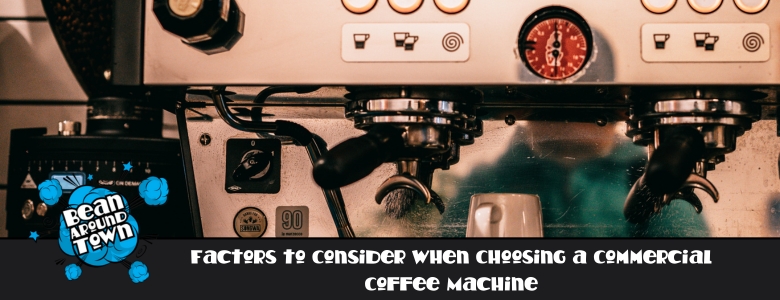
Selecting the right commercial coffee machine involves considering several key factors that impact your business’s efficiency and customer satisfaction. These include the machine’s size and capacity, its features and functionality, and your budget and financing options.
Taking these factors into account will help you choose a machine that meets your specific needs and delivers great coffee consistently.
Size and Capacity
Understanding the venue’s size, customer volume, and staff capabilities is crucial in guiding the choice of coffee machine. High customer volume venues may require machines that can serve multiple beverages simultaneously, ensuring that customers are served quickly and efficiently.
The amount of bench space available can also determine the type and size of the coffee machine to choose, making it important to check the dimensions of the machine to ensure it fits the space and can be safely supported.
Choosing a machine that matches your venue’s capacity needs can significantly impact the efficiency of your operations and the quality of the coffee served. To make an informed decision, it’s essential to consider both the physical space and the demand.
Features and Functionality
The features and functionality of a commercial coffee machine play a significant role in its performance and ease of use. Group heads, for instance, are essential for controlling water temperature and pressure during the coffee brewing process, directly impacting the quality of the brewed espresso.
Machines with separate boilers for brewing and steaming offer improved temperature stability, which is crucial for producing consistent coffee.
Budget and Financing Options
Budget considerations are a critical factor when choosing a commercial coffee machine. New machines generally come with warranties that provide protection against potential defects, which can be a significant advantage.
However, premium commercial coffee machines often have a higher cost than standard machines, making it essential to evaluate your budget and financing options carefully.
Flexible finance options, such as Rent-Try-Buy plans, allow businesses to rent or try machines before committing to a purchase, alleviating upfront costs and providing flexibility.
It’s also important to consider the warranty details before purchasing a new machine to ensure you are covered for any potential issues.
Popular Commercial Coffee Machine Brands
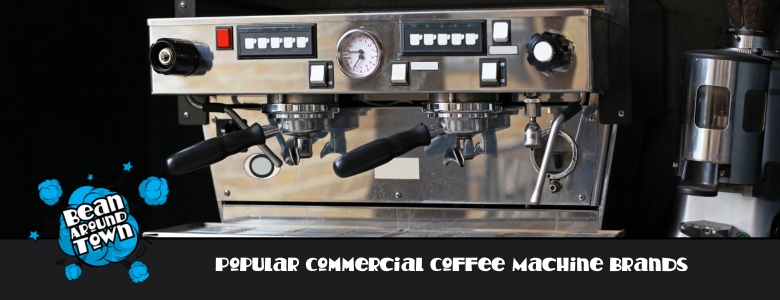
Choosing the right commercial coffee machine brand is essential for ensuring quality coffee production and operational efficiency. Notable brands in the industry include La Marzocco and Synesso each offering unique features and benefits that cater to different needs and preferences.
La Marzocco
La Marzocco coffee machines are renowned for their exceptional durability and high performance in busy environments, making them a premium choice for many café owners. The Linea Classic model, in particular, is favoured for its essential features and ease of use, providing reliable performance and consistent coffee quality.
The robust construction of La Marzocco machines justifies their premium price, as they are built to withstand the demands of high-volume settings. This durability ensures that your investment will continue to deliver great coffee for years to come.
Expobar EX3: Versatile, Customisable, and Reliable
The Expobar EX3 is a professional espresso machine that combines style, versatility, and cutting-edge functionality. Designed with a modular approach, the EX3 allows extensive customisation to meet the unique needs of any café or coffee shop.
From its sleek, modern aesthetic to its robust engineering, the EX3 is a seamless fit for both boutique cafés and high-traffic coffee chains. Its adaptability extends to both external and technical options, offering baristas and café owners unparalleled control over performance and design.
Key Features
- Customisable Design: Choose from a variety of finishes, colours, and accents to match your space’s style.
- User-Centric Functionality: Features like shot timers, dual pressure gauges, and barista lights enhance ease of use, enabling precision in every cup.
- Performance-Driven Engineering: Built with Crem’s renowned technologies, the EX3 ensures exceptional in-cup quality with adjustable options for bar pressure, water flow speed, and temperature.
Maintenance and Cleaning of Commercial Coffee Machines
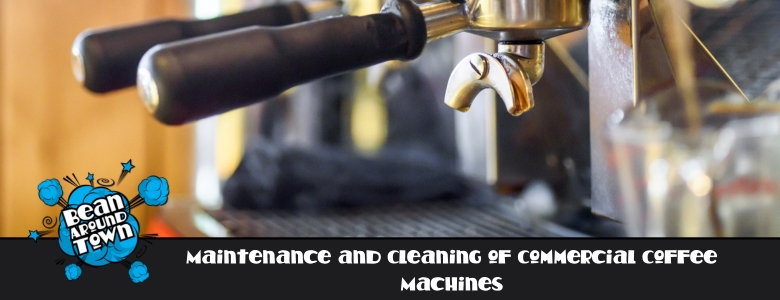
Proper maintenance and cleaning are crucial for the longevity and performance of commercial coffee machines. Regular servicing and proper usage can extend the lifespan of a machine, ensuring it continues to deliver great coffee for years.
Neglecting maintenance can lead to poor-tasting coffee and costly repairs, so it’s essential to establish a routine for cleaning and servicing.
Daily Cleaning Routines
Daily cleaning routines are essential for maintaining the performance and longevity of commercial coffee machines. After each use, it’s important to flush out the water from the group head to eliminate any residual coffee grounds that could affect the taste of the next brew. Using a microfiber cloth to wipe down the steam wand after each use helps prevent blockages and maintain its effectiveness in frothing milk.
Neglecting daily cleaning tasks can lead to machine malfunctions and decreased coffee quality, ultimately affecting customer satisfaction. Incorporating these simple cleaning habits into your daily routine ensures that your machine stays in top condition and produces exceptional coffee.
Scheduled Maintenance
Scheduled maintenance is equally important to prevent breakdowns and extend the lifespan of high-volume coffee machines. To keep them running smoothly, it’s recommended that they be serviced three to four times per year. Regular servicing helps identify and address potential issues before they become major problems, reducing downtime and ensuring consistent coffee quality.
Water quality and filtration systems also play crucial roles in maintaining coffee machines’ longevity. Filtered water can prevent mineral buildup and other issues that could impair the machine’s performance. Adhering to a maintenance schedule and ensuring good water quality keeps your commercial coffee machine in excellent working order for years.
Pros and Cons of New vs. Second-Hand Commercial Coffee Machines
When deciding between new and second-hand commercial coffee machines, it’s important to weigh the pros and cons of each option.
New machines offer the latest technology, warranties, and higher reliability, while second-hand machines provide substantial cost savings but may come with unknown histories and no warranty.
Advantages of New Machines
New commercial coffee machines typically come with comprehensive warranties, providing peace of mind and financial protection for the buyer.
These machines are generally more reliable due to their untouched condition and adherence to the latest manufacturing standards, reducing the risk of breakdowns during high-volume periods.
The added benefit of incorporating the latest technology can enhance performance and efficiency, making new machines a worthwhile investment for many businesses.
While the initial cost is higher, the reliability and advanced features of new machines can justify the investment in the long run.
Benefits of Second-Hand Machines
Purchasing second-hand coffee machines can lead to significant cost savings compared to buying new. These machines are often available at a fraction of the cost of new models, making them a budget-friendly option for many businesses.
Opting for used coffee machines can still provide great value, especially if they are certified or refurbished, to ensure they meet quality standards. While there may be some risks associated with unknown histories and lack of warranties, the potential cost savings can make second-hand machines an attractive option for budget-conscious buyers.
Summary
Choosing the right commercial coffee machine involves understanding the various types, key components, and factors that influence their performance and suitability for your business.
Each component plays a crucial role in delivering high-quality coffee, from the robust boilers and group heads to the essential steam wands. Additionally, considering the size, capacity, features, and budget will help you make an informed decision that meets your specific needs.
By exploring popular brands like La Marzocco and Expobar, you can find machines that balance durability, performance, and innovation. Regular maintenance and cleaning are essential to keep your machine in top condition, whether you choose a new or second-hand model.
Ultimately, the right commercial coffee machine can enhance your business’s efficiency, customer satisfaction, and overall coffee experience.
Frequently Asked Questions
What are the main types of commercial coffee machines?
The main types of commercial coffee machines are fully automatic, semi-automatic, and manual. Each type caters to different operational needs and user preferences, allowing you to choose the right fit for your business.
Why is regular maintenance important for commercial coffee machines?
Regular maintenance is essential to prevent breakdowns and ensure consistent coffee quality, ultimately extending the lifespan of your commercial coffee machine. Ideally, high-volume machines should be serviced three to four times annually, with daily cleaning routines implemented to maintain optimal performance.
What are the advantages of new commercial coffee machines?
New commercial coffee machines offer significant advantages such as comprehensive warranties, increased reliability, and advanced technology that enhances performance and efficiency.
These benefits justify the higher initial investment, making them a smart business choice.
What should I consider when choosing a commercial coffee machine?
When selecting a commercial coffee machine, consider your venue’s size, expected customer volume, staff expertise, machine features, and budget.
This approach will ensure you choose a machine that caters to your specific requirements while maintaining quality coffee service.
What are the benefits of second-hand commercial coffee machines?
Second-hand commercial coffee machines provide substantial cost savings, making them a budget-friendly option. Opting for certified or refurbished models ensures you maintain quality standards while enjoying these savings.





